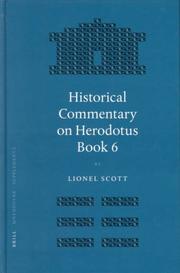| Listing 1 - 10 of 23 | << page >> |
Sort by
|
Book
ISBN: 3788100826 9783788100827 Year: 1974 Volume: 82 Publisher: Göttingen: Muster-Schmidt,
Abstract | Keywords | Export | Availability | Bookmark
 Loading...
Loading...Choose an application
- Reference Manager
- EndNote
- RefWorks (Direct export to RefWorks)
Greece --- History --- Iran --- Greece - History - Persian Wars, 500-449 B.C
Book
ISBN: 3760835651 9783760835655 Year: 1973 Publisher: München: Artemis,
Abstract | Keywords | Export | Availability | Bookmark
 Loading...
Loading...Choose an application
- Reference Manager
- EndNote
- RefWorks (Direct export to RefWorks)
History, Ancient --- Greece --- History --- Greece - History - Persian Wars, 500-449 B.C
Book
ISBN: 8804378050 9788804378051 Year: 1998 Publisher: Milano: Mondadori,
Abstract | Keywords | Export | Availability | Bookmark
 Loading...
Loading...Choose an application
- Reference Manager
- EndNote
- RefWorks (Direct export to RefWorks)
History, Ancient --- Greece --- History --- Greece - History - Persian Wars, 500-449 B.C --- Greece - History - To 146 B.C

ISBN: 3519010143 9783598710148 9783519010142 Year: 1991 Volume: 1014 Publisher: Stuttgart: Teubner,
Abstract | Keywords | Export | Availability | Bookmark
 Loading...
Loading...Choose an application
- Reference Manager
- EndNote
- RefWorks (Direct export to RefWorks)
Classical Greek literature --- Greece --- Grèce --- History --- Drama --- Histoire --- Théâtre --- Grèce --- Théâtre --- Historiography --- Drama. --- Greece - History - Persian Wars, 500-449 B.C. - Historiography
Book
ISBN: 9780199560707 9780199560714 0199560706 0199560714 Year: 2015 Volume: *3 Publisher: Oxford: Oxford university press,
Abstract | Keywords | Export | Availability | Bookmark
 Loading...
Loading...Choose an application
- Reference Manager
- EndNote
- RefWorks (Direct export to RefWorks)
In this new edition of Herodotus' "Histories," Nigel Wilson has revised the original Oxford Classical Text by the Danish scholar C. Hude, published in 1906 and last revised in 1927. As well as incorporating much of the valuable work on the text that has been conducted since the original edition, in particular that of J. Enoch Powell and Paul Maas, Wilson has taken into account new readings from over 80 papyri. In addition, clarity in the apparatus criticus has been improved by the collation of two previously neglected medieval manuscripts, which belong to the so-called Roman family. A number of passages remain puzzling, and Wilson proposes new solutions and provides plausible emendations wherever possible. This new edition is accompanied by a commentary, 'Herodotea', written by the editor, in which he explains many of the editorial decisions he made while revising this key classical text.
Greece --- Iran --- History --- History, Ancient. --- Herodotus. --- History (Herodotus) --- To 146 B.C. --- Greece. --- History (Herodotus). --- Greece - History - Persian Wars, 500-449 B.C. --- Iran - History - To 640
Book
ISBN: 9780300120851 9780300168808 0300168802 0300120850 1299463711 9781299463714 Year: 2010 Volume: *1 Publisher: New Haven, CT ; London Yale University Press
Abstract | Keywords | Export | Availability | Bookmark
 Loading...
Loading...Choose an application
- Reference Manager
- EndNote
- RefWorks (Direct export to RefWorks)
How did the city-state of Athens defeat the invaders from Persia, the first world empire, on the plain of Marathon in 490 BCE? Clever scholars skeptical of our earliest surviving source, Herodotus, have produced one ingenious theory after another. In this stimulating new book, bound to provoke controversy, Peter Krentz argues that Herodotus was right after all. Beginning his analysis with the Athenians' first formal contact with the Persians in 507 BCE, Krentz weaves together ancient evidence with travelers' descriptions, archaeological discoveries, geological surveys, and the experiences of modern reenactors and soldiers to tell his story.Krentz argues that before Marathon the Athenian army fought in a much less organized way than the standard view of the hoplite phalanx suggests: as an irregularly armed mob rather than a disciplined formation of identically equipped infantry. At Marathon the Athenians equipped all their fighters, including archers and horsemen, as hoplites for the first time. Because their equipment weighed only half as much as is usually thought, the Athenians and their Plataean allies could charge almost a mile at a run, as Herodotus says they did. Krentz improves on this account in Herodotus by showing why the Athenians wanted to do such a risky thing.
Marathon, Battle of, Greece, 490 B.C --- Marathon, Battle of, 490 B.C. --- Marathon, Battle of, Greece, 490 B.C. --- Greece --- Iran --- History --- Persian Wars, 500-449 B.C.
Book
ISSN: 0777978X ISBN: 9789042930407 9042930403 Year: 2014 Volume: 233 Publisher: Leuven: Peeters,
Abstract | Keywords | Export | Availability | Bookmark
 Loading...
Loading...Choose an application
- Reference Manager
- EndNote
- RefWorks (Direct export to RefWorks)
Marduk-remanni was a Babylonian man who lived in the provincial town of Sippar during the first decades of Persian rule in Mesopotamia (second half of the sixth century BC). His archive of c. 187 cuneiform texts was found in 1881 during excavations carried out on behalf of the British Museum, but since then it has received little attention. On first sight, the historical relevance of Marduk-remanni's records seems minimal. They relate to his private assets, business enterprises, and legal concerns - matters that barely seem to transcend the personal and local spheres. But upon closer scrutiny, it becomes clear that Marduk-remanni was at the centre of a far-flung personal network and that his life, despite his having lived far from the political centre, reflects many of the developments and changes taking place at the highest imperial level. He was a child when Cyrus the Great of Persia conquered Babylonia, and although this regime change caused little upheaval outside the political arena at first, by the time of Marduk-remanni's death several decades later, the world of his childhood had changed. 0His life had taken a completely different course than that of his father and grandfather. He had traveled near and far, visiting the Persian court at Susa on several occasions. No longer were the horizons of his world confined to the Babylonian heartland, as they had been for his father and grandfather. Marduk-remanni was born in provincial Babylonia, but he died as a citizen of a world empire. This book traces the social, economic and political dynamics that transformed his life.
Akkadian language --- Marduk-rēmanni, --- Babylonia --- Sippar (Extinct city) --- History --- Marduk-rēmanni, --- Academic collection --- Civilization [Assyro-Babylonian ] --- Persian wars , 500-449 B.C. --- Authors --- Biography --- History and criticism --- Cuneiform tablets --- Iraq --- Inscriptions (Akkadian) --- Sources --- Akkadian language - Texts --- Marduk-rēmanni, - active 6th century B.C. --- Babylonia - History - Sources --- Sippar (Extinct city) - History - Sources
Book
ISBN: 9780300116427 030011642X 9780300218602 0300218605 9780300227093 0300227094 Year: 2015 Publisher: New Haven: Yale university press,
Abstract | Keywords | Export | Availability | Bookmark
 Loading...
Loading...Choose an application
- Reference Manager
- EndNote
- RefWorks (Direct export to RefWorks)
"More than 2,500 years ago a confederation of small Greek city-states defeated the invading armies of Persia, the most powerful empire in the world. In this meticulously researched study, historian Paul Rahe argues that Sparta was responsible for the initial establishment of the Hellenic defensive coalition and was, in fact, the most essential player in its ultimate victory. Drawing from an impressive range of ancient sources, including Herodotus and Plutarch, the author veers from the traditional Atheno-centric view of the Greco-Persian Wars to examine from a Spartan perspective the grand strategy that halted the Persian juggernaut. Rahe provides a fascinating, detailed picture of life in Sparta circa 480 B.C., revealing how the Spartans' form of government and the regimen to which they subjected themselves instilled within them the pride, confidence, discipline, and discernment necessary to forge an alliance that would stand firm against a great empire, driven by religious fervor, that held sway over two-fifths of the human race."--Dust jacket.
Sparta (Extinct city) --- Greece --- History --- Strategic aspects --- Civilization --- Sparte (Ville ancienne) --- Grèce --- History. --- Strategic aspects. --- Civilization. --- Histoire --- Civilisation. --- Grèce --- HISTORY / Ancient / Greece. --- Antiken --- Sparta (Extinct city) - History --- Sparta (Extinct city) - Strategic aspects --- Sparta (Extinct city) - Civilization --- Greece - History - Persian Wars, 500-449 B.C.

ISBN: 9004145060 9789004145061 9781429453592 1429453591 9781433707223 1433707225 1280868473 9781280868474 9786610868476 6610868476 9047407989 9789047407980 Year: 2005 Volume: 268 Publisher: Leiden: Brill,
Abstract | Keywords | Export | Availability | Bookmark
 Loading...
Loading...Choose an application
- Reference Manager
- EndNote
- RefWorks (Direct export to RefWorks)
This volume offers a historical and factual commentary on Herodotus book 6. The introductory discussions include one on the background to the Ionian revolt and the role of Histiaeus. The commentary aims to assess the reality behind Herodotus' text: the revolt and its aftermath; the various aspects of Spartan affairs in the middle of the book; Datis' invasion of Eretria and Attica; and Miltiades' expedition the following year. Material that cannot conveniently be dealt with in the commentary itself, and a number of related topics that merit consideration, are considered in a series of appendices. These include discussions of Cleomenes' madness in relation to his activities in Arcadia, and the Argive reaction to his victory at Sepeia.
Herodotus. --- Greece --- Grèce --- History --- Historiography. --- Histoire --- Historiographie --- Historiography --- Grèce --- Griechenland --- Hellas --- Yaṿan --- Vasileion tēs Hellados --- Hellēnikē Dēmokratia --- République hellénique --- Royaume de Grèce --- Kingdom of Greece --- Hellenic Republic --- Ancient Greece --- Ελλάδα --- Ellada --- Ελλάς --- Ellas --- Ελληνική Δημοκρατία --- Ellēnikē Dēmokratia --- Elliniki Dimokratia --- Grecia --- Grčija --- Hellada --- اليونان --- يونان --- al-Yūnān --- Yūnān --- 希腊 --- Xila --- Греция --- Gret︠s︡ii︠a︡ --- Herodotus --- Persian wars , 500-449 B.C. --- Ionian Revolt, 499-494 B.C. --- Historical criticism --- Authorship --- Criticism --- Ionian Revolt (Greece : 499-494 B.C.) --- Persian Wars (Greece : 500-449 B.C.) --- History (Herodotus) --- Hērodotou historiai (Herodotus) --- Historiai (Herodotus) --- Historiae (Herodotus) --- Mousai (Herodotus) --- Herodotus (Herodotus) --- Histories (Herodotus) --- Musae (Herodotus) --- Hērodotou Halikarnēssēos Historiōn logoi ennea (Herodotus) --- Historiōn logoi ennea (Herodotus) --- 500-449 B.C --- Greece. --- Gret͡sii͡ --- Greece - History - Ionian Revolt, 499-494 B.C. - Historiography --- Greece - History - Persian Wars, 500-449 B.C. - Historiography

ISSN: 00851671 ISBN: 3525252633 9783525252635 Year: 2006 Volume: 164 Publisher: Göttingen: Vandenhoeck und Ruprecht,
Abstract | Keywords | Export | Availability | Bookmark
 Loading...
Loading...Choose an application
- Reference Manager
- EndNote
- RefWorks (Direct export to RefWorks)
Batailles --- Battles --- Veldslagen --- Marathon, Battle of, Greece, 490 B. C. --- Bataille de Marathon, Grèce, 490 av. J.-C. --- Greece --- Grèce --- History --- Campaigns --- Histoire --- Campagnes et batailles --- Marathon, Battle of, Greece, 490 B.C --- Plataea, Battle of, Plataiai, Greece, 479 B.C --- Memory --- Political aspects --- Influence --- Battles. --- Marathon, Battle of, Greece, 490 B.C. --- Plataea, Battle of, Plataiai, Greece, 479 B.C. --- Bataille de Marathon, Grèce, 490 av. J.-C. --- Grèce --- Plataea, Battle of, 479 B.C. --- Marathon, Battle of, 490 B.C. --- Fighting --- Combat --- Military art and science --- Military history --- Sieges --- War --- Iran --- Marathon [Battle of ] (Greece), 490 B.C. --- Plataea [Battle of ] (Greece), 479 B.C. --- Persian wars , 500-449 B.C. --- Klassieke Oudheid. (Reeks) --- Griekenland (Oud-). Geschiedenis. (Reeks) --- Rome (Oud-). Geschiedenis. (Reeks) --- Civilisation gréco-romaine. (Collection) --- Antiquité classique. (Collection) --- Grèce ancienne. Histoire. (Collection) --- Rome ancienne. Histoire. (Collection) --- Antieke cultuur. (Reeks) --- Memory - Political aspects --- Greece - History - Persian Wars, 500-449 B.C. - Influence
| Listing 1 - 10 of 23 | << page >> |
Sort by
|

 Search
Search Feedback
Feedback About UniCat
About UniCat  Help
Help News
News